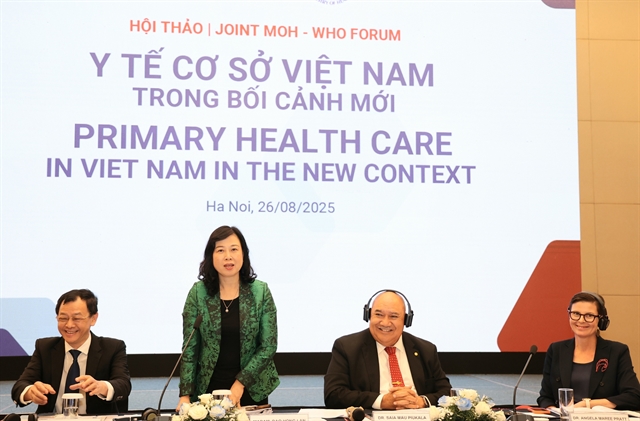 Society
Society


|
| Minister of Health Đào Hồng Lan addresses the joint forum alongside the World Health Organization's Western Pacific regional director Dr Saia Ma'u Piukala. — Photo suckhoedoisong.vn |
HÀ NỘI — Primary healthcare is the foundation of Việt Nam’s health system, ensuring universal coverage, fairness, quality and efficiency of the public health services, said Minister of Health Đào Hồng Lan at a joint forum with the World Health Organization (WHO) in Hà Nội on Tuesday.
She noted that strengthening grassroots health services has always been a strategic priority for the Party and Government, aligned with global commitments under the Alma-Ata (1978) and Astana (2018) declarations on primary healthcare.
To fully realise the role of primary healthcare, the health sector must build public trust in the quality of local health services providing essential care with a people-centred approach, while reducing or removing barriers and improving access.
The health minister noted that this is a major and challenging task. However, with the efforts of the health sector, the leadership of the Party and Government, the inter-ministerial engagement, the support of the people and assistance from partners, primary healthcare will continue to be improved to meet both the population’s needs and the rapid changes in society and the economy.
As Việt Nam transitions to a two-tier local governance model, primary healthcare – particularly at the commune and ward levels – will undergo several changes to align with and effectively implement policy objectives.
“However, we remain committed to ensuring that there is no disruption to healthcare services for the people during this transition,” said Lan.
Việt Nam’s health insurance coverage has reached over 94 per cent, supported by an extensive network of commune and ward health stations and regional medical centres in 34 cities and provinces.
Addressing the event, WHO Regional Director for the Western Pacific Dr Saia Ma'u Piukala noted that Việt Nam has achieved many important milestones in healthcare, with some results comparable to those of developed countries.
Việt Nam has also made significant progress in primary healthcare. By 2024, vaccination coverage had surpassed 95 per cent, making a vital contribution to the country’s strong recovery after the COVID-19 pandemic and protecting millions of children.
In addition to its high health insurance coverage, Việt Nam also made improvements in reducing maternal mortality from 83 deaths per 100,000 live births in 2000 to 48 in 2023.
Dr Piukala also highlighted Việt Nam’s progress in reducing the burden of malaria, as well as eliminating leprosy and rabies.
However, Việt Nam still faces multiple challenges, notably the increase in non-communicable diseases. Population ageing, antimicrobial resistance and recurrent infectious disease outbreaks are also putting pressure on the healthcare system.
According to Dr Piukala, the solution lies in ensuring local access to primary healthcare services, which can deliver 90 per cent of essential services, thereby saving lives and fostering economic growth.
The WHO regional director also stressed that the organisation will continue its commitment to work with Việt Nam towards a future where everyone can access quality healthcare in their community throughout their life.
At the forum, local and international experts also discussed issues related to financing for primary healthcare, the delivery of services at commune-level health stations under the two-tier local government model, procurement and bidding processes, and mechanisms for medical service payment. — VNS




